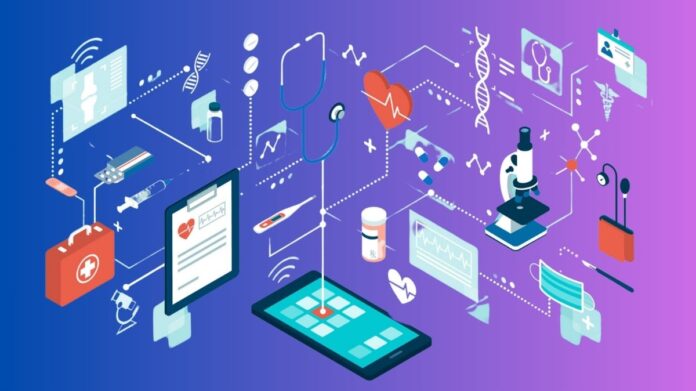Healthcare Cloud Computing Market
The Healthcare cloud computing market uses cloud computing technology and services. Internet-accessible cloud servers store, manage, and process healthcare data and applications.
Cloud computing improves data and application accessibility, scalability, flexibility, and cost-effectiveness in healthcare. With little on-site infrastructure, healthcare organizations can store and analyze massive amounts of patient data, collaborate and share securely, and install healthcare applications.
Introduction
Healthcare cloud computing is revolutionizing patient care and data administration with scalable, safe, and economical choices. This article discusses cloud computing’s benefits, drawbacks, and healthcare applications.
Cloud Computing in Healthcare
Better Healthcare Data Management and Storage using Cloud Computing
Healthcare practitioners may safely store enormous volumes of patient data thanks to the reliable data storage options provided by cloud computing. The scalability of the cloud makes expansion simple and requires little initial outlay of funds.
Scalability: By utilising cloud services, healthcare institutions may easily expand their storage requirements as needed, guaranteeing that data management stays up with the growing amount of research and medical records.
Information Safety: Patient data is transported and stored securely, lowering the possibility of breaches, thanks to advanced encryption techniques and adherence to laws like HIPAA.
Better Accessibility and Cooperation
Cloud computing makes healthcare collaboration easier by offering data access anywhere, anytime.
- Doctors and other medical professionals can remotely access patient data, diagnostic results, and treatment plans, improving care delivery in telemedicine.
- Tools for Collaboration: Cloud platforms offer integrated solutions like shared EHRs to help care teams coordinate and communicate in real time.
Economic Effectiveness
The affordability of cloud services is advantageous to healthcare organizations.
Lower IT Costs: Healthcare cloud computing providers can save money on maintenance by utilising cloud infrastructure instead of costly on-premises gear.
Pay as you proceed Model: Cloud services are frequently provided via subscription, which enables businesses to allocate their budgets as efficiently as possible by only paying for the resources they really utilize.
Obstacles in Cloud Computing for Healthcare
Concerns about Data Security and Privacy. Although cloud computing has improved security, data privacy and security remain concerns.
Compliance: To secure patient data and avoid legal concerns, observe HIPAA, GDPR, and other healthcare legislation.
Threats to cybersecurity: Cyberattacks in healthcare are common. Protecting sensitive health data requires strong cybersecurity.
Combine with Current Systems
Integrating cloud technology with healthcare systems is complicated.
Legacy Systems: Many healthcare firms employ outdated legacy systems that are hard to connect with cloud computing.
Mutual Compatibility: Healthcare apps and systems must communicate well to share and integrate data.
Internet dependence
Cloud computing requires reliable internet access, which may be limited.
Network Reliability: Cloud-based healthcare systems may struggle in places with poor internet connections.
Latency issues: Latency in data transfer can affect cloud application performance, affecting real-time decision-making and patient care.
Cloud Computing Healthcare
AI/ML Integration in Healthcare Cloud Computing: Future Prospects
Cloud computing, AI, and ML will transform healthcare.
Predictive analytics: AI and ML systems can examine massive medical data to predict disease outbreaks, patient outcomes, and treatment plan optimization.
Personalized medicine: Cloud-based AI systems can generate patient-specific treatment plans by processing clinical and genetic data, increasing outcomes.
Internet of Things in medicine
Modern cloud computing solutions are becoming more critical as medical IoT devices spread.
Real-time monitoring: IoT devices can store and analyze patient data on the cloud to give healthcare providers immediate insights and alarms.
Data Integration: Cloud systems can integrate data from IoT devices to give decision-makers a more complete patient health picture.
Better Security using Blockchain Technology
Blockchain technology is gaining popularity as a Healthcare cloud computing security and transparency solution. Blockchain makes medical records irreversible and tamper-proof, improving data integrity and confidence. Blockchain’s decentralized data storage reduces single-point failures and cyberattacks.
Cloud Computing in Healthcare Industry
Healthcare cloud computing stores
Healthcare cloud computing stores, manages, and processes medical data and applications on remote servers over the internet. Healthcare organizations can use cloud-based services instead of hospital or clinic servers for:
EMR storage and access: Cloud storage secures and centralizes EMRs, making them accessible to authorized providers from anywhere with an internet connection. This promotes care coordination and collaboration among patient-care providers.
Cloud computing improves data analytics for massive medical datasets. This can help doctors spot trends, predict illness outbreaks, and customize treatment approaches for improved patient results.
Telehealth and remote patient monitoring: Cloud systems enable these services. This lets patients see distant doctors or manage chronic diseases at home.
IT infrastructure costs are lower since healthcare organizations don’t need pricey physical servers and IT professionals. Cloud service providers maintain and upgrade servers, letting hospitals focus on their core expertise.
Enhanced disaster recovery: Cloud storage provides data backups for natural disasters and system breakdowns. This reduces downtime and maintains care.
Security and compliance are key in Healthcare cloud computing. Cloud service companies that comply with HIPAA protect patient data with strong security measures.
Consider these other points:
- Cloud computing is growing rapidly in healthcare as hospitals, clinics, and others adopt it.
- Healthcare businesses can fulfil security needs with public, private, or hybrid cloud computing.
- Cloud computing has many benefits, but you need a trustworthy vendor with a track record in healthcare data protection.


